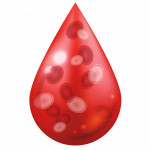HIV-positive people may face a lower risk of diabetes than their HIV-negative peers, according to new data comparing HIV-positive and HIV-negative veterans and published in the June 19 issue of AIDS. However, the risk may be higher among those with certain risk factors, including hepatitis C virus (HCV) coinfection, obesity and the long-term use of certain antiretroviral (ARV) medications.
Combination ARV treatment has been proved to significantly increase survival in people with HIV. Unfortunately, a number of the HIV medications have been shown to increase the risk of blood sugar irregularities, potentially raising the risk of diabetes. Additionally, as people with HIV grow older and more obese, researchers fear a further increased risk of diabetes among HIV-positive individuals.
To further explore diabetes risk factors, Adeel Butt, MD, from the University of Pittsburgh School of Medicine, and his colleagues, analyzed data collected for the Veterans Aging Cohort Study (VACS). Butt’s group examined blood work and other health information collected from 3,227 HIV-positive former soldiers and 3,240 HIV-negative volunteers. More than 90 percent of the participants were male, and the majority were between 40 and 60 years old.
A significant percentage, 30 percent, of the HIV-positive veterans and 15 percent of the HIV-negative veterans were infected with HCV. Also, more than 50 percent of the HIV-positive patients and 38 percent of the HIV-negative patients had a history of drug use.
Overall, HIV-positive patients were less likely than HIV-negative patients to have diabetes, 14.9 percent versus 21.4 percent respectively. This difference, however, was largely accounted for by a difference in body mass index (BMI) between HIV-negative and HIV-positive patients. According to the study team’s analysis, HIV-negative cohort participants were more likely to be overweight—a risk factor for diabetes—than HIV-positive patients.
Risk factors that worked against people living with HIV included HCV coinfection and long-term use of ARV therapy, notably regimens that included a nucleoside reverse transcriptase inhibitor or a protease inhibitor. Among HIV-positive veterans with these risk factors, the chance of developing diabetes was higher compared with their fellow HIV-negative study volunteers.
Surprisingly, heavier alcohol use was associated with a lower diabetes risk, despite the fact that it can lead to liver damage, which is itself a diabetes risk factor. The authors hypothesize that the association may be due, in part, to the likelihood that a person who drinks heavily is more likely to have a lower BMI.
In all, the factors associated with diabetes risk in people with HIV appear to vary considerably. Because clusters of different risk factors can affect a person’s diabetes risk in different ways, the authors urge further research be conducted.
Advertisement
Advertisement
Advertisement






2 Comments
2 Comments